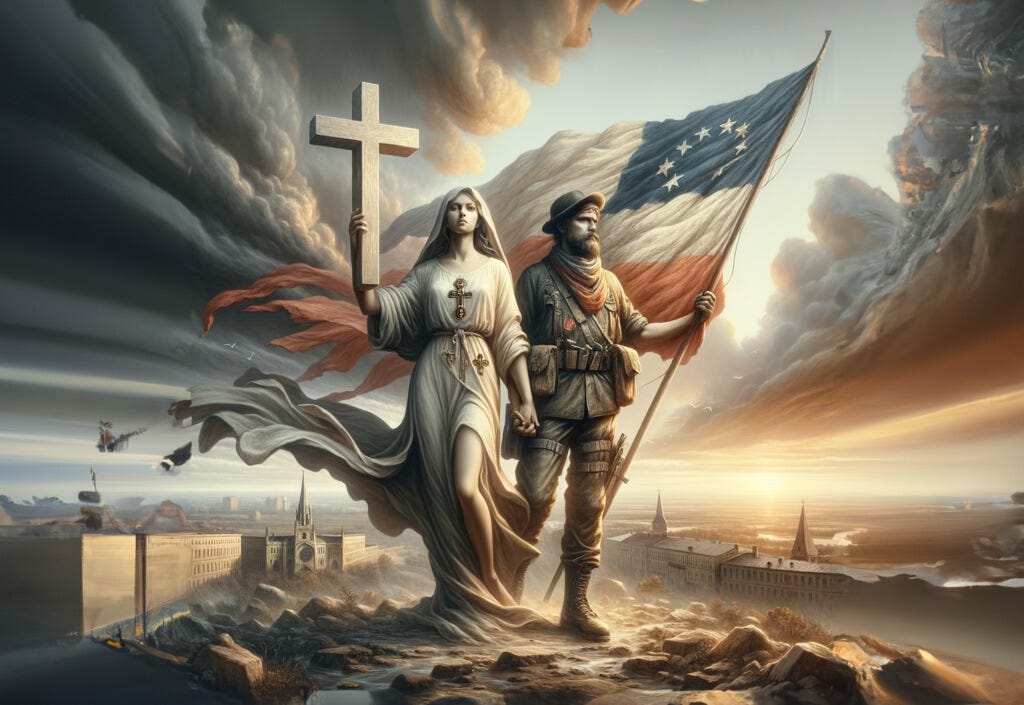The rise of Christian nationalism: a beacon of conservative values in a polarized world
At a time when the fabric of society seems increasingly fraught with ideological divisions, the concept of Christian nationalism has become the focus of intense debate and often misunderstanding. At the center of this discourse is the figure of Russell Vought, a key advocate and strategist preparing for a potentially transformative second term under Donald Trump. With his close ties to Trump and his role as president of the Center for the Renewal of America, Vought is at the forefront of a conservative consortium committed to putting Christian values back at the center of American government.
Christian nationalism, contrary to the often pejorative formulation of its critics, is not a call for exclusion, but a reminder of the historic founding of the United States on Christian principles. This ideology argues for prioritizing these values in government and public life, especially in the face of the nation's increasing secularization and diversification. The efforts by Vought and his team, according to documents obtained by POLITICO, underscore a strategic push to emphasize Christian nationalism as central to a future Trump administration, highlighting policies that resonate strongly with a broad swath of the American population.
Critics, particularly from the left and mainstream media outlets like CNN and Politico, often use the term "Christian nationalism" as a weapon to marginalize and smear those who uphold conservative and Christian values. They misrepresent nationalism and patriotism and equate them with extremism in order to promote globalization and undermine the sovereignty of nation states. This narrative, heavily influenced by Marxist ideologies, portrays religion - in this case Christianity - as the "opium of the people", a concept famously attributed to Lenin. This view aims to divide and weaken communities by marginalizing conservative and Christian values and portraying them as outdated or oppressive.
What is often overlooked in this criticism, however, is the inherent strength and unity of a community bound together by shared values and beliefs. A society that embraces its national identity, cultural heritage and religious foundations is better able to resist the homogenizing pressures of globalization and the divisive tactics of those who seek to undermine national sovereignty.
In Germany and throughout Europe, the media's portrayal of Christian nationalism and conservatism mirrors the polarization in the United States. This distorted portrayal fits into a larger narrative that aims to marginalize traditional values and replace them with a globalist ideology that favors open borders, secularism and a one-size-fits-all approach to politics. The rise of Christian nationalism is therefore not just an American phenomenon, but a reaction to a global crisis of identity and sovereignty.
In its positive form, nationalism is about celebrating and preserving a nation's heritage, culture and values. It fosters a sense of belonging and pride among people and encourages unity and cooperation towards common goals. This is in stark contrast to the unhealthy aspects of globalism, which often lead to a dilution of cultural identity, an erosion of national boundaries and the imposition of external values on sovereign nations.
The comparison between healthy nationalism and unchecked globalism reveals a fundamental choice between preserving the unique character and independence of nations and capitulating to a homogenized one-world government. Christian nationalism, as espoused by figures like Vought, is a clarion call to the United States - and indeed to nations worldwide - to reaffirm its commitment to the values and beliefs that have historically defined it.
As the world stands at a crossroads, the debate over Christian nationalism and its role in shaping the future of governance is more than just an ideological skirmish. It is a battle for the soul of nations, a struggle to preserve the fundamental principles that ensure freedom, sovereignty and unity in an increasingly fragmented world. The efforts of Vought and like-minded individuals to infuse a second Trump administration with Christian nationalist ideas are a defining moment in this ongoing struggle that will undoubtedly determine the direction of global politics in the years to come.




